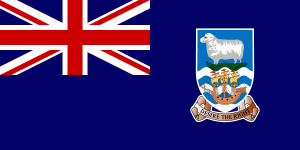
KINGSTOWN, St. Vincent – This country has not banned ships that fly the Falkland Islands flag from sailing to its ports.
Prime Minister Dr. Ralph Gonsalves made the point during a press briefing yesterday as he reemphasised that ships from the South American islands, at the heart of a 180-year-old sovereignty dispute between Argentina and Britain, do not sail to this country.
The Bolivarian Alliance for the Peoples of Our America (ALBA) at its recent meeting in Venezuela, passed a resolution supporting a decision by Argentina, Brazil, Paraguay, and Uruguay from sailing to their points.
Gonsalves said last week that the agreement was “symbolic” noting that Falkland Islands ships do not come here.
“And all those meeting did was say that you support those countries doing that. It didn’t say St. Vincent and the Grenadines or Antigua or Dominica is going to do it. We support those countries doing it because no ship with the Falklands comes to St. Vincent,” Gonsalves said at the press briefing yesterday.
Antigua and Barbuda has since distanced itself from the resolution saying that its position is that of CARICOM: the Falkland Islanders should determine their own future.
Gonsalves said that in supporting the decision by the four South American nations, ALBA simply added a paragraph to a resolution adopted by the Community of Central American and Caribbean States (CELAC) last December.
CELAC believes that the dispute should be settled by peaceful means, through the auspices of the Organisation of American States (OAS) and the United Nations.
“We ain’t say we banning. We say we support those four countries in their decision. That is what it says,” Gonsalves said of the ALBA resolution.
“I am not backtracking. I know what is here. I can read English. I made my living reading English. People pay me to read English properly for them as a lawyer,” he further stated, adding that since the Falkand Islands is a colony, its flag is not recognised in international law.
Gonsalves’ media briefing, though prescheduled, came about an hour after Opposition Leader Arnhim Eustace voiced on radio concerns about the ALBA resolution.
“So what they are trying to do, line up the whole of Latin America and the Caribbean members of ALBA against the people of the Falkland Islands?” said Eustace, whose New Democratic Party (NDP) last week met with a two-member delegation from the Falkland Islands legislature that visited this country.
The NDP, Eustace said, believes that Falkland Islanders must determine their own future. “That’s for them to decide, in the same way in 1979 we decided in St. Vincent and the Grenadines that we are going to be independent. … That’s their right.”
He said that the Falklands wants to maintain its status as a self-governed British Overseas Territory because of fears that if it becomes independent, Argentina, which lost a war with Britain over the islands 30 years ago, will invade.
Eustace said that with the ALBA resolution, the government has found itself “in some hot soup” because it in December supported of self-determination by the Falkland Islands.
He said that reneging on those decision have implications for the country’s foreign relations, including with Britain and other European countries.
“These are very serious matters. The government always says it operates on principle. What is the principle here now?”
Eustace said that Gonsalves made the “excuse” that Falkland Islands ships don’t sail to this country. He further noted the statement by the Antigua and Barbuda government that they do not support the ALBA resolution.
“And they are a member of ALBA, too. We are waiting to hear now what St. Vincent and Dominica [are] going to say about that.
But Gonsalves, speaking at the press briefing yesterday, said that Britain has said that any discussion with Argentina over the islands will not include sovereignty even as Argentinian says that Britain is so far away and in 1833 Britain chased the Argentinians from the islands and replaced them with its own citizens.
“Now, that is an issue where two principles at the U.N. collide: … the issues of territorial integrity and the issues of the right of self-determination,” Gonsalves said.
“We have good relations with Britain, we have good relations with Argentina. We have historically strong relations with Britain and those relations we are building with Argentina is bilateral but very importantly, in the multilateral context,” he said.
“Nobody wants war,” Gonsalves further stated, adding that the Argentinians “are not talking about blockade”.
“The people in the Falklands use their airspace you know. Nobody blocks them,” he said, adding that some commentators do not understand the issues.
He said that while countries can support whichever side of the dispute they choose, it is important to settle the issue peacefully as the OAS and U.N have suggested.
The E.U., Gonsalves said, has made it plain that the issue is creating a difficulty for them in trading with Mercosur – the Common Southern Market — a bloc comprising Brazil, Argentina, Uruguay, and Paraguay.
“You think the European Union is going to get in any bassa bassa on a trading issue for the Falklands, with 3,000 people, to block their way? Why don’t we all just grow up and understand the complexities of the world, shed colonial thinking and look at issues dispassionately,” Gonsalves said.
“… I am the Prime Minister of St. Vincent and the Grenadines and I have to watch how the world is changing and we have to find spaces. And not to search for spaces to knock over pails of milk that existed there before but to find additional pails of milk for us to move forward with our development. The world is changing,” he said,





